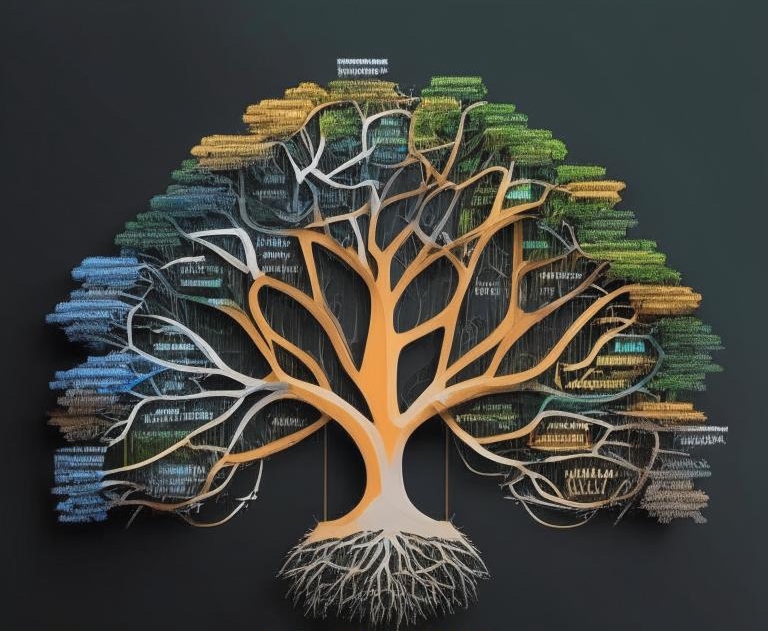Common Stages
by Oleg Sovetnik
In previous articles, we have already explored the key elements that shape both sociological research and the software development process. We have analyzed what constitutes the object and subject of study, examined the processes of conceptualization and operationalization, and discussed how facts are formed and tested. Now, it’s time to take a look at this process as a whole to trace how the movement from theoretical foundations to final conclusions and results occurs, whether in the form of scientific findings or a working software product.
In both fields—sociology and programming—we can identify four stages that make up the general structure of the process of knowledge acquisition and system creation: fundamental theory (or programming paradigm), conceptualization (defining entities), operationalization (defining properties), and finally, fact verification through testing or empirical observations. In this article, we will examine how these stages interact to form an integrated approach to research and development.
Four-Stage Structure in Sociology
In sociological research, the process of moving from theory to facts can be divided into four key stages:
-
Fundamental theory — This is the starting point of any scientific research. Theory provides the basic concepts, categories, and models through which social phenomena can be explained. For example, theories like structuralism or action theory define how exactly social roles, interactions, and processes should be understood. The theory sets the framework within which the researcher will interpret the collected data.
-
Conceptualization — At this stage, models are created that reflect the entities and processes being studied in the research. The researcher determines which specific elements of social reality will be analyzed and creates abstract categories for their description. For example, in the study of public spaces, concepts like “personal space,” “social roles,” or “interaction frames” might be defined. These concepts form the basis for further analysis.
-
Operationalization — This is the step where abstract concepts are transformed into measurable characteristics. The researcher determines how exactly the selected concepts can be observed or measured. For example, the concept of “public space” could be operationalized through the analysis of people’s behavior in elevators or stores. In elevators, strangers typically do not communicate because the frame of public space does not imply interaction, while in stores, interaction with a consultant is possible as this action fits into a different frame.
-
Facts — The final stage, where facts are formed based on empirical data. Facts are statements that can be verified through observation or experiment. For example, the statement “strangers do not talk in elevators” becomes a fact only within a specific conceptual scheme of public space, when observations confirm this behavior.
Four-Stage Structure in Programming
In programming, a similar structure can be traced, which also passes through four key stages:
-
Programming paradigm — This is the foundation upon which development is built. The paradigm defines how to organize code, structure data, and handle processes. A programmer chooses a paradigm that will set the key principles and approaches to solving tasks. For example, in an object-oriented paradigm, data is represented as objects with methods, while in a functional paradigm, the focus is on transforming data through functions.
-
Conceptualization — At this stage, a model of the subject area is developed. The programmer defines the key entities and their relationships that need to be implemented in code. For example, in a user management application, entities such as “user,” “session,” “profile” are conceptualized. This is the step of creating abstract objects that will be embodied in the software model.
-
Operationalization — The next step is to define the properties and characteristics of these entities. For example, what does it mean for a “user to be active”? Operationalization might include defining the criteria for user activity: “A user is considered active if they have logged in at least twice in the last week.” This allows you to set specific rules for subsequent system behavior testing.
-
Tests (facts) — The final stage, where developers create tests to verify whether the system’s behavior and state meet the expectations set in the previous stages. For example, the statement “the user is active” is verified with tests that simulate user behavior and check their activity under the given conditions.
Connecting Sociology and Programming Through Fact Formation
At both levels—sociology and programming—the formation of facts is based on similar principles. Facts do not exist in isolation but are formed within a specific conceptual scheme, where objects (such as social roles or software model entities) acquire their properties through the process of operationalization. Fact verification occurs through testing in programming or through empirical observation in sociology.
For example, the statement “strangers do not talk in elevators” in sociological research would be confirmed by observing and analyzing behavior in public spaces. In programming, similarly, the statement “the user is active” would be verified through tests that confirm the system accurately tracks user interaction.
We see that sociology and programming, despite their differences, follow a similar logic in the process of constructing and verifying statements. In both cases, researchers and developers start from fundamental theoretical or paradigmatic foundations, then move on to creating abstract models (conceptualization), transform these models into measurable and verifiable characteristics (operationalization), and complete the process by verifying facts through observations or tests.
This parallelism in approaches helps to better understand how disciplines focused on studying society and creating technologies can enrich each other, offering more integrated methods of analysis and system development.
sociology umwelt research
